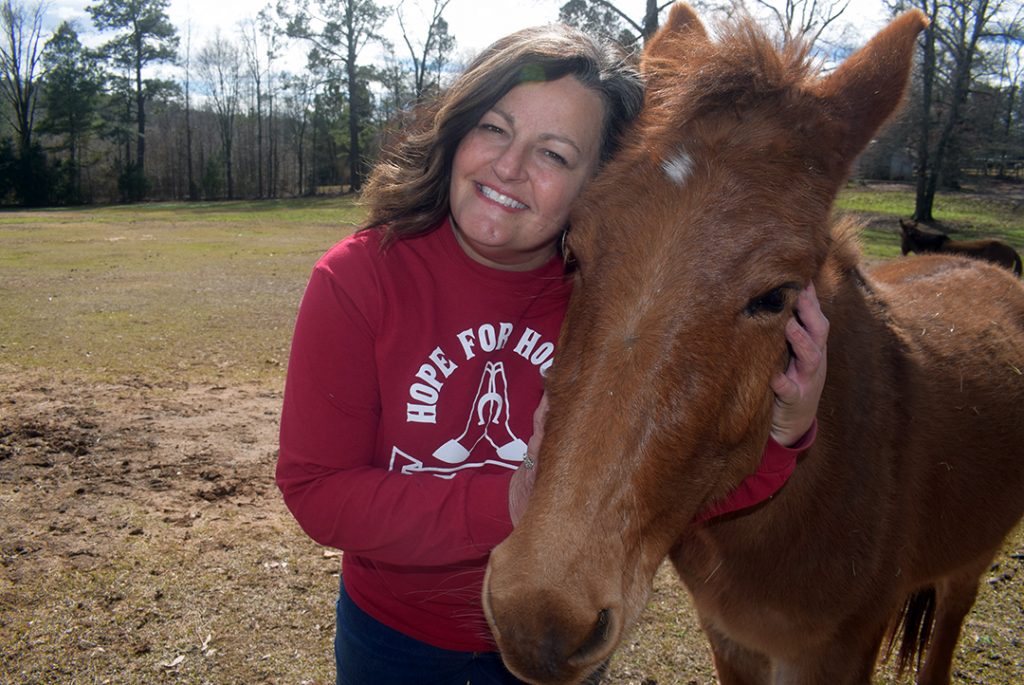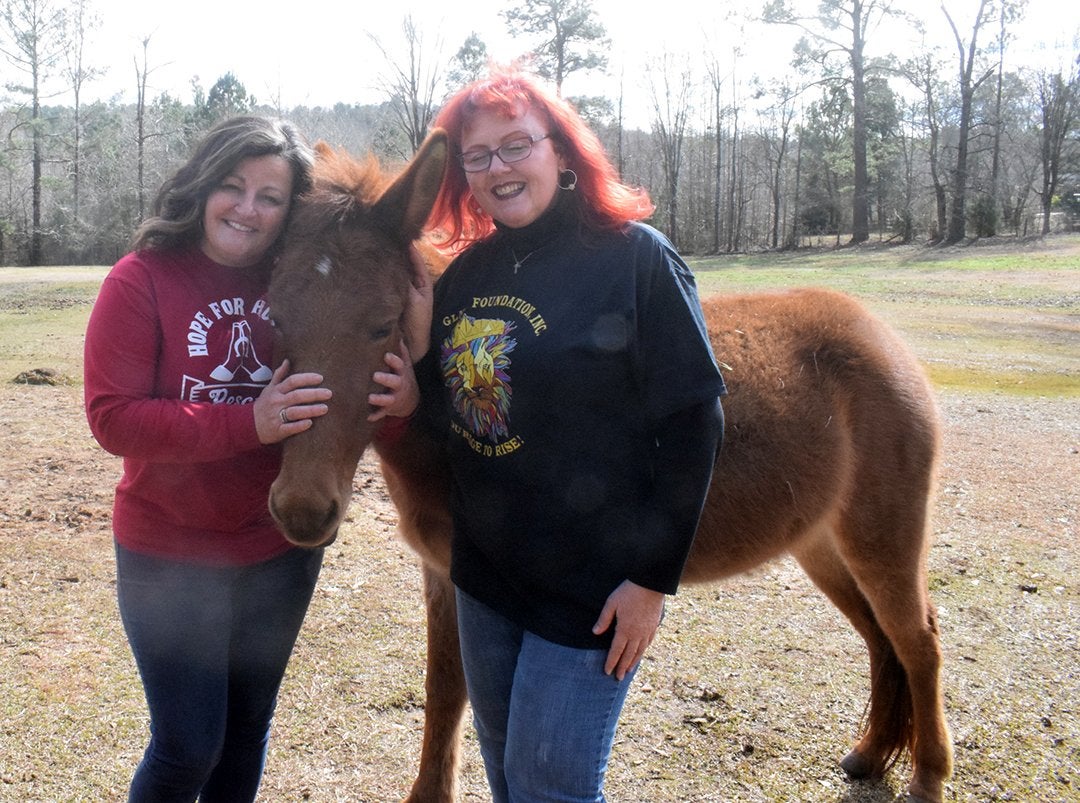Kimberly McDonald-Walden and Michelle Derrick head two different organizations with distinct missions. Yet, they’ve found common ground to benefit each other and those they serve.
McDonald-Walden helps women and their children who’ve come out of sex trafficking through the GLM2 (God Loves Me, Too!) Foundation, and Derrick rescues abused and neglected animals through Hope for Hooves.
Sex trafficking is a complex and layered situation with many variables, but one thread is common. Those who come out of it are broken and lack trust in others.
[adrotate banner=”30″]
“In a lot of cases, family members are the cause of the trauma and abuse. These people don’t trust anybody,” said McDonald-Walden, who enlists Derrick’s animals to provide an emotional and spiritual healing for those GLM2 is assisting. “When they come out here (to Derrick’s North Augusta farm), they are quiet and timid.”
In most cases, it’s the animal making the first step toward the human.
“Abused creatures recognized abused creatures,” she said.
Derrick’s organization hasn’t even been in place for a year, but a lot has happened in that time.
Derrick had been abused as a child. She knew trauma. As an adult, she found a different kind of trauma when she was diagnosed with breast cancer in 2013. She had a mastectomy and reconstruction and complications. After a few cancer free years, her cancer returned in 2018, but it had spread.
Derrick had reached a low point in her life, and then she met a donkey named Cora, who radically changed her world. When she found Cora, it was love at first sight, she said. She knew she had to adopt her, and Cora wanted Derrick to do the adopting. Cora tried to go home with Derrick before Derrick’s husband even built a spot for her.

Derrick needed Cora more than she knew.
“I didn’t want to talk to people,” said Derrick, who went several months without even telling her husband that the cancer had returned.
But she did talk to Cora. In talking to Cora, Derrick spilled out her heart. In a way, she said, it was like praying. It wasn’t formal; it was just her thoughts.
“I could talk to her like I talk to God,” she said.
One night, Derrick was crying with her hands covering her face, when Cora nudged her. The two looked at each other, and Derrick had a sense that everything would be okay.
Derrick has been on an experimental treatment that has kept the cancer at bay despite the spread.
Derrick knows firsthand how animals can provide a healing touch. Cora helped her mentally and emotionally, and she’s helped multiple animals including horses, mules and donkeys.
What Derrick experienced can also help those McDonald-Walden works with.
Through GLM2, McDonald-Walden is currently helping 17 adults and 35 children. There are many issues those coming out of sex trafficking face. She wants to see those families get on their feet.
The women often have multiple strikes against them; some through no fault of their own. They may have been in jail for prostitution, drugs or weapons possession. Having a criminal record, no job history and bad or no credit keeps them from passing a background check required to live in an apartment complex in most cases.
[adrotate banner=”19″]
McDonald-Walden works with them to find a place to live, get them the necessities to live and provide them with food.
Her long-term goal is much broader. It includes a two-year residential program on a horse farm. The goal is to set women up for success not failure. McDonald-Walden said short term programs are good, but women need longer.
The program goal is multi-faceted and would teach life skills such as budgeting and money management. Women could live on the housing on-site, learn job skills, build a rental history, credit history and save money that could be used toward a down payment on a house.
It’s not a quick fix, but it is designed to address the fundamental issues they’ve faced. Many of the women have had drug problems. McDonald-Walden wants to get to the heart of the issue that pushed them to their addiction in the first place.
But they have trust issues. That’s where the partnership between Derrick and McDonald-Walden comes in.
The animals, they said, can break down the emotional barriers the families have built to protect themselves.
[adrotate banner=”23″]
Derrick said that happened with Cora, and McDonald-Walden has watched similar things happen with the people she works with.
She’s brought them to see the animals at Derrick’s farm.
Children, who were quiet and reserved because of their trauma, often start opening up because they want to talk about the animals and their farm experiences. They bond with the animals. They get excited about the visits. That in turn, she said, gives them something to look forward to. She’s seen the children start paying more attention to their schoolwork because they know they’ll be able to go spend time with the animals.
And the loving nuzzles from the animals often bring an emotional comfort that they’ve not had, they both said.
Derrick has goals too. She currently has about 10 acres, but she’d like to have more land to bring in more abused and neglected animals.
Both organizations are nonprofits, and both women believe their faith in God has brought them to take on these areas.
To learn more about GLM2, visit www.facebook.com/glm2.life and to learn about Hope for Hooves, visit www.facebook.com/hopeforhoovesrescue.
Charmain Z. Brackett is the Features Editor for The Augusta Press. Reach her at charmain@theaugustapress.com
[adrotate banner=”38″]













